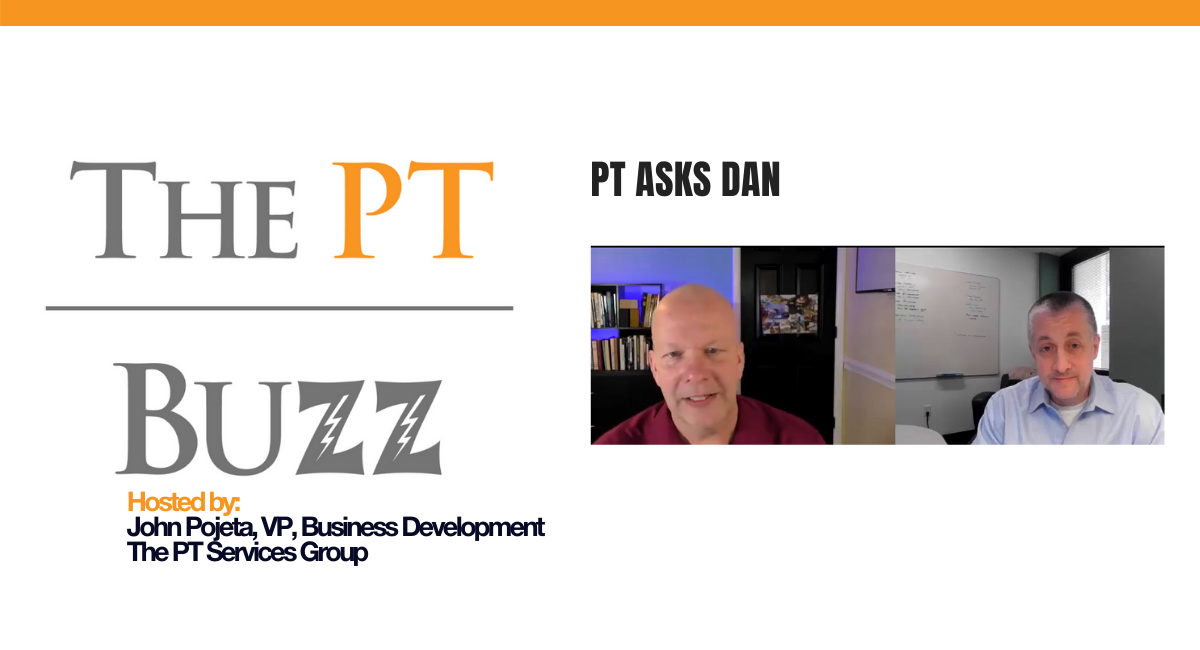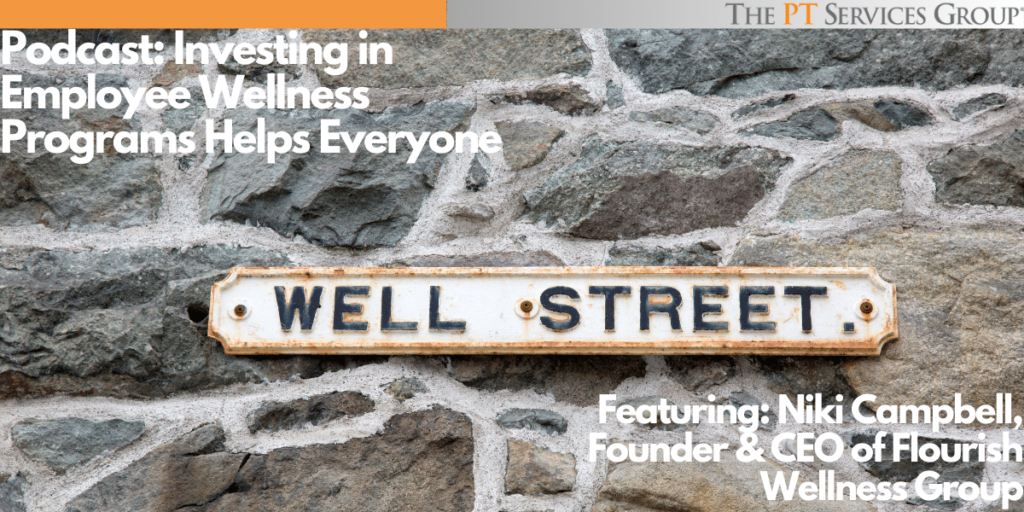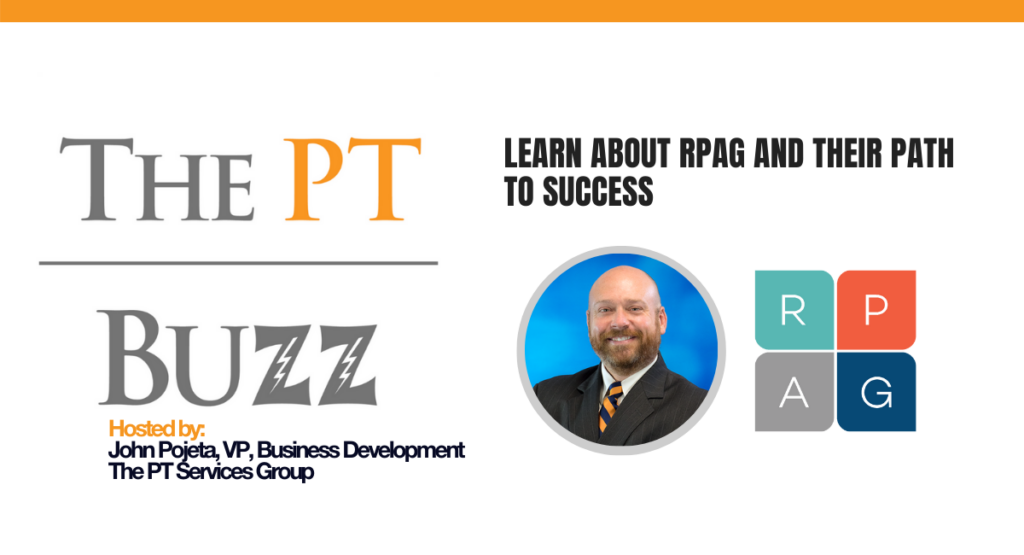Last month, PT launched a new, daily video series – PT Asks Dan, with our resident sales guru, Dan Hudock. In these 2-3 minute videos PT’s John Pojeta asks Dan about one, specific topic and Dan provides unique, actionable advice. We’ve collected 10 of these sales tips into one podcast, that will leave you energized and excited to attack your lead list.
Where to Listen/Subscribe














Podcast Resources:
Any and all resources we mentioned in the podcast can be found here. Looking for something not here? Contact us, we’d love to help you out.
Guest Bios:
 Dan Hudock, Owner of Sandler Training/PT Sales Guru
Dan Hudock, Owner of Sandler Training/PT Sales Guru
Dan Hudock is owner of Sandler Training, Wexford. Recognized as one of the top Sandler trainers and speakers in the world, Dan is able to provide hard hitting insights into the world of management and selling that few people can equal. Humor, life stories, and a passion for results enable participants to truly change their world.
Dan works with many of The PT Services current clients to maximize their impact and growth.
Podcast Transcript:
John Pojeta: Hi, everyone, John Pojeta here with the PT Services Group. Hope we’re doing very well. And welcome back to another episode of the PT Buzz, and today’s session is a little bit different. So what we started about a month ago with our sales coach, Dan Hudock is asking him a question and videotaping it and putting it up on LinkedIn daily.
So, what we want to do in this podcast now is bring together 10 of those Q and A’s and put them into one listening episode for you. You’ll see us doing this going forward twice a month. So you’ll get 20 Q and A’s with Dan via the podcast. Or you can go to my LinkedIn page and you can find them there too.
If you want to isolate a specific Q and a. But it’s a great opportunity to learn from what he’s teaching others and how he’s helping salespeople in general with very specific dilemmas that they face and things to change. And that’s really where we’re trying to help you be tangible is take a question.
See yourself in it, figure out how you can adjust, make very specific changes in your prospect meetings that will lead you to better results. So hope you enjoy the episode. And as always, please visit us@theptservicesgroup.com backslash buzz. You’ll see this episode, many others up there as well. Love your feedback and love to hear from you two on questions.
Tap/Click to View Full Transcript
You’d like us to ask Dan in a very specific fashion and he’ll give us a very direct answer. Thanks so much. And we’ll see you. So Dan, what I want to talk about a little bit today is, is we’re at that front end of the new year, and there’s sort of that new year’s resolution, or just that change mentality that kicks into some degree for everybody.
It’s just, Hey, I want to start doing these things differently in the new. And one of the realities we know is for salespeople. Sometimes it’s really hard to change. It’s hard to do some things differently that we know in our heart of hearts, we really need to do differently. And I’m no different. It happens to me too.
Um, so what I was thinking of a little bit about is, is one. Why do you think that is? And then secondly, for those that are struggling to really implement earnest, honest, genuine change, what advice would you give.
Dan Hudock: Yeah. So let’s start from the very beginning. At the end of the day, we have two choices. We can just play it safe in our life.
And, and, you know, I heard someone say a long time ago as a comedian, he goes, you know, when I die, I don’t want them to put me into ground. And I’m looking all new and shiny and neat and everything like that. And, and he goes, because I want to just be beat up and bruised and cut and broken and just kind of slide into the grave.
And that is the second choice we can choose to enjoy life at its fullest. And I think too many people try to play it safe. They’re not willing to stick their neck out. So having said that if you are someone who’s wanting to achieve, a goal is wanting to make a change is wanting to improve. I’m going to share with you three main reasons why people fail at that.
And then of course, that will teach you what you can do to avoid it. Number one, we forget that in order to do something new. We have to give up something old. And let me give you a real good example. It’s people that say, you know, come January 1st, I’m going to wake up an hour earlier and hit the gym. The problem is they don’t go to bed an hour earlier.
They go to bed at the same time, and that could only work for so long before they become exhausted. And then there goes that goal. So just realize you’re going to have to give up something in order to get it. Second willpower will only take you so far. It’s one of the reasons why diets fail. We can’t just do it by willpower.
That will last for a couple of days. And then you see a cake and then you eat the whole thing. What needs to occur is we have to think differently about who we are. I’m a healthy person. If you think that you’re going to act differently and number three, the big reason people fail at goals, they never said.
It is honestly to goodness, the truth set a goal, change the way you think and give up something to get it in a way you go.
John Pojeta: Yeah. It’s really fascinated with that. One of the things I, I took a look at before we got started today was. January 17th is the day that the vast majority of people already have surrendered or given up on new year’s resolution.
So it happens fast when he is talking about willpower, giving up things that you have to, to let go of in order to implement the change, et cetera. So I think it’s very salient advice. One of the things that’s interesting in our particular space, working for a lot of financial advisors and insurance planners are.
That’s what they help their clients do all day long. It plan goals, set goals, meet goals. So it should be inherently embedded inside of them to do that as well. But as we know, sometimes we can be the worst at what we help others do.
Um, I want to chat a little bit about the realities and the evolution we’ve seen. I know we did a podcast on this recently in depth, so there’ll be a link to that in this as well, but. People having a little bit of Zoom fatigue and shifting away from a Zoom conversation for the first appointment, but needing to utilize it with existing clients and for future appointments.
So meetings two plus, and I think a lot of people really got themselves in tune with all right, Zoom 1 0 1. If you want to think about it that way, what are the basics? The angle, the camera, the mic for this, that all those kinds of things. But now I think we’re, we’re at that stage where we need to think about how do you take that to another step to help advance your sales side.
So what, what’s your advice and what are your thoughts on getting people to sort of Zoom two point? Oh
Dan Hudock: yeah. So first of all, I kinda tell you, John, I’m absolutely amazed. We’re two years into the pandemic. And I’m on Zoom with people and they can’t get their video, the work, they can’t get their audio to work.
Their background looks horrible two years in this, come on, we should know this a lot better. So with all due respect, let me kind of go back to the basics. We we’ve got to have really good videos. So you want to make sure your background is professional looking. You don’t want to be sitting in front of a window as an example.
Where you get that dark look with a big, bright light behind you. You want to make sure that, that it just looks clean and looks professional sound wise. You want to make sure that you have a really good microphone, all that kind of stuff. So that’s the basics. If we look at Zoom 2.0, so to speak, I came up with a couple really simple things that we can.
Number one. We have to be careful if the camera angles still, I can’t tell you how many times I’m on a call with someone and their camera is below their face. And what starts to happen is I start to see up their nose as they’re talking to me. Yep. It’s very gross. So the camera angle actually should be slightly higher than your eyes and that way it comes down on you and makes you look more professional.
Number two is making sure that your eyes are focused on where the camera is not the screen. So right now I’m looking at you on the screen. You can see a difference if you’re seen as video versus if I look up at the camera. So you want to be looking at the camera, not the screen. Number three, maintain really good posture.
Smile. I can’t tell you how many people look like they’re eating prunes when they’re on these calls. And it’s just come on. We got to smile a little bit. Yep. Number four, closed down all of your apps. Other than Zoom, close everything down. Cause that just eats up computer stuff, energy and you need to have, um, Zoom come through a lot better.
And the last tip invest. It doesn’t take a lot of money, but invest in a really good camera and a really good microphone. It doesn’t take a lot, but it makes a huge deal.
John Pojeta: Yeah, all the difference in the world. One of the things that really jumps out that I think, and you, and I know this from our early days in sales, the whole idea of smile and dial.
And when you’re doing things like this, or you’re recording something, the sheer value in laughing about something right before you start recording, I think really changes the flavor. So smile. Be upbeats. I think there’s a lot more merit to that than people want to give tight. So I totally agree.
I wanted to talk about meeting prep and, and you and I have talked for years about don’t over prepare for a conversation that you don’t know where it’s going to go. Cause assumptions come into play, all that kind of stuff. So pen, paper, business card, list of questions. Stop. So one of the things though that I don’t think we’ve talked about or spend enough time on is the reality of how the prospect got in front of you.
So we would think of as lead source. So referral center includes introduction, PT, cold appointments, everything that happens in between. Because the meeting structure and how you approach it can be different because of where they are in the process and what kind of upfront skepticism they have. So thinking about a little bit on the lead source, how the person got there, what advice would you have from a meeting prep standpoint?
Dan Hudock: Well, first of all, let’s talk about the referral or a highly qualified introduction. Most of us know how to close that type of business. You don’t need help with that. In fact, most of PTs client. The type of business, they typically close. So I’m going to leave that alone for the most part. I do want to come what happens if it’s based off of a cold call?
Or an appointment that’s set by someone like PT. See, here’s the thing that sales people have a tendency to do what I call, show up and throw up. They show up, they ask a question, the person says, well, this is what I need. And before you know, it, the salesperson is answering that and explaining all the great things they do and their eight point plan.
And, and they’re giving them the brochure of all the stuff they created and everything like that. And then you wonder why you don’t get the business. Here’s the key, the key to a cold call appointment. That’s being set that first meeting is you have to ask fantastic questions. So these are things that you need to write down ahead of time.
What questions do I want to make sure I ask and make sure that they are. Spectacular. Cause you will get people that will say a lot. Oh, that’s a great question. Or I never thought of that before and that’s what, you know, you’re on track. The second thing is establishing that upfront contract. Here’s how much time we have.
Here’s your agenda? Here’s my agenda. And here’s the outcome of a no, we’re done. I’ll come over. Yes, we set up the next appointment. So let’s summarize, you will get the buyer to trust you a lot. If you ask great questions instead of making great statements, take it away, John.
John Pojeta: Well, there’s one thing that, uh, that a PG client told me recently that he said, look, it took me a while to figure out PT appointments.
There was kind of that acclimation to it because to your point, used to referrals, centers of influence, all that kind of stuff he said, but the one other big change I made was I realized I was going into PT appointments a little bit more. Tight. Hmm. Because I had some uncomfortableness to it. I’d go into referral appointment on a be super relaxed, calm, casual, not casual, but clearly at ease, let’s put it that way.
And he said, when I realized I could take that same personality kind of trait into a cold appointment, it also helped me put the prospects of these. Because I was there. So yeah, one other thought there love
Dan Hudock: it.
John Pojeta: We want to talk about ghosting now, before we get into your thoughts and advice on dosing, one of the things I know you always go back to versus if you’re experiencing consistent ghosting. It’s not about what you’re then doing. It’s about how you’re conducting the meeting before getting ghosted. So that’s a whole different conversation, but there are still times, even if when you do things properly, that it plays out, somebody goes dark on you, whatever the case may be.
What thoughts do you have or what advice you have in trying to deal with that? Post-meeting to try and close the loop one way or the other is yes or no.
Dan Hudock: Yeah. So first of all, call them. Text or email them and the message if you get their voicemail sounds, something like this. Hey John, it’s Dan, give me a call when you have a second, that’s it not?
I’m calling to find out what the status of the quote, blah, blah, blah, blah. So just call and leave a quick message. Second, wait two to three business days and call them again. Don’t wait two to three weeks. Two to three business days and call them again. And if you’re still not hearing back from them, now’s the time to take action and I would call them and I would also send them this email.
And it’s what I call the close the file call. It’s going to say something like this. Hey John, when owners of companies don’t call me back, it’s usually because of one of three things. Number one, maybe they’ve been sick. COVID maybe they’ve been on vacation. Number two, maybe business or life just that happening.
And you can’t even take a breath, let alone return my call or number three, they’ve decided to go another route and not use my company. And that’s okay if I don’t hear from you by the end of business on Thursday, I will assume it was number three and close your file. Always willing to take your call in the future.
Best of luck and great success to you when you do that. You will either hear nothing from them. And then you close the Powell, move on. Number two, when you do that, they will call and say, yeah, we decided to move on to something else. That’s fine too. Number three, is that they will call or email you and say, no, no, no, I am interested, but, and here’s the delay.
Call me back. That’s great. Or number four, they’ll call or email you and say, Hey, I’m actually ready to get going. Yeah. Yeah.
John Pojeta: Well, two quick questions follow up. Why do people text an email versus call?
Dan Hudock: Because it’s the safest thing to do? Hey, sales is all about living on the edge.
John Pojeta: That’s the next thing an email’s not living on the ed.
Yeah, no, I, I, I get to the, the, the other thing that then helps salespeople avoid, which I think they can sort of use as a crutch to some degree is the concept or the idea of, well, they’re sort of still in the pipeline. Cause I haven’t gotten a net, you know, almost that mental game that we play with ourselves of our pipeline is really more robust and it makes us feel better.
So
Dan Hudock: for the most part, John, the only person that doesn’t know that it’s a no. It’s the salesperson
John Pojeta: or they’re just at least not willing to admit it. That’s right. You got it.
I want to talk about the proverbial, providing them a quote. And one of the things we come across a lot and, and. And it happens to me where I’m like, all right, but as we go through a sales process, we get to a point where it’s really not going the way we want it to go. We’d like to think or see it be different, but we still go ahead and provide a quote anyway, with the thinking of, if we don’t, we’re not going to get the business.
So. I’ll put it on the pile. So I it’s, there’s some genuineness to the right. It’s better than not kind of thing. Um, we have a really hard time as salespeople saying, no, I’m not going to do that to a prospect and what our reasons are. So one, are there other reasons you see people still. Putting the quote out there when they’re asked to do so.
And what are the best piece of advice you’d give them to get away from doing that and control the process a little
Dan Hudock: bit better. Yeah. So it’s there’s truth. If you don’t give the quote, you don’t get the best. That’s legit, even if that’s a 1% chance. That’s legit. So here’s the thing. When we get an RFP and RFQ, first thing we have to decide is how did this come across my desk?
How did I get this? If it’s an organization that’s vetting a lot of different companies to come up with a few. Ah, I might play in that area, but if it’s one that came across cold or whatever, and there’s a lot of detail in there and I didn’t help create that. I might not choose to play in that, that ball field.
So to speak, one of the first things you should do is pick up the. Thank them for the quote and say, I have several questions I want to ask you. And what I find is if they’re willing to entertain those questions and answer them and not push back hard, you got a really good shot there, but if they start pushing back real hard, You don’t have a shot there.
It’s really not worth it. A client of mine was doing 300 quotes a year and ended up with about 15 pieces of business. Now, each one was about a million dollars, so it was big. But when I was talking to the CEO, he said, well, we have to quote, or we won’t get it. I said, all right, what would happen though? If instead of quoting 300 times to get 15, what if you quoted 40 and you got.
And see when we start to look at it that way, it makes a difference. Ultimately, here’s the problem with a lot of quotes that don’t end up in sales. It hurts us psychologically. It really does. It pulls us down. It drains us. It’s like, it just makes it harder to sell other stuff all the way around. Yeah.
John Pojeta: And I don’t think we put enough credence in the psychological impact of sales and marketing and success and stick to witness and all those kinds of things.
And what you’re describing with that 300 to 40, imagine the time savings of. Two 60, especially on million dollar deals, the prep that has to go in to make that happen. And it’s okay to say, no, we all deal with those people. We get on the phone or we get on the line with them or we get nose to nose and their first question.
All right. What’s this going to cost that’s right. And you gotta decide how you’re gonna handle those things, et cetera. But, uh, I love the idea of the merit of controlling the process 40 to 30 versus 350 or even 40 to 15 and the time play and all that good
Dan Hudock: stuff. Right. Well, and here’s the other thing, too, when we look at all the quotes outstanding, we know in our heart of hearts, most of those are going to be a no that’s depressing.
It really is. Yes.
John Pojeta: On that note press on now. No, no, I get it. It’s that psychological impact of sales and all the things go with it. So, yup.
What I want to talk about is skills and improving skills in the field that we’re in on the financial services, insurance side, MSP side, there’s that constant drive to get better at product services, knowledge, designation, all those kinds of things. And I think to some degree, there’s a desire not to be positioned as a sales person, but as an advisor or something.
But that need to work on sales skills, improve sales skills. We talk about it with doctors. They have surgical skills to get better at athletes are probably the most famous of, Hey, first show up last leave. Great at efforting and working hard and all that kind of stuff. One of the most fascinating things I saw, I saw Tom Hanks doing an interview and when he was teeing up doing a toy.
They had him read one line, 15 different ways with a ton of intensity and he read two or three of them to give us a sense of what he was talking about and how important it was. And so he would do that in advance of these auditions. And we’re talking about somebody. Many ways doesn’t need to audition. So other than hiring a sales coach like yourself, Dan, what are some of the other things you would say when it comes to sales skills, people should be doing regularly to improve.
Dan Hudock: So, first of all, nobody wants to be that sleazy liar, high pressure, high commission sales person. That’s how a lot of salespeople are. I’m not saying that people listening to this podcast are this webcast, but there’s a lot of those types of people out there. So how do we not be a typical salesperson? I think there are three things that we can work on.
Technique behavior. An attitude. So when we look at technique, it’s learning how to do things differently than other people. There’s a lot, there’s a saying that goes, if your competition’s doing it, stop it, do something different. So, so learning some, some really great technique that does not put. On the buyer is a really good one behavior.
So that’s goal setting, that’s planning, that’s actions, that’s developing a, a prospecting plan. It’s all that kind of stuff. Making sure that I do the behavior necessary for sales, but by far, the biggest is changing my attitudes and my. And part of that is about who I am as a person. And this is one of these weird psychological things.
But if we improve ourselves, then our sales actually go up. And when we look at three areas that we can really improve ourselves, one is our body. One is our mind and one is our spirit. And by body, I mean, what are we doing? Exercise, eat well, sleep well, all that kind of stuff. If we liked the way we look or we liked the way we score, we’re going to look.
We behave better. The second is how are we, what are we feeding our minds? What are we reading? What are we listening to? And then spirit, I like to look at it like, what are you doing to de-stress yourself? Especially during rough times. And we all know sales is full of bumps and bruises and ups and downs.
So what are we doing about that? So if you work on all those areas and you make yourself different than everyone else, sales will start to come after that. Yeah.
John Pojeta: Well, as with most things in life, the beauty. Tomorrow we get up and we get to do it all over again and be a little bit better at it and try again and have better attitude and all those kinds of things.
But I think what you’re stressing there with the attitude of body, body, mind, and spirit, not enough time gets spent there too much gets spent on, but the technical side, especially. So, yeah, good stuff. Thanks so much, Dan.
So prospects have a lot of conversations with salespeople and they’re very used to them and they’re used to a certain. Process or they have certain expectations. And when you step out of those expectations, do things differently, but in an impactful pay capturing of the imagination way, it really changes their experience and how they view you and your memorable to them.
So we always talk about developing pain, getting in there. Mind a little bit, but not in an invasive or manipulative way, but getting to the root of things. So aside from the pain side, what are some of the other things that a producer sales person can do to be memorable and be
Dan Hudock: different? Number one, use the upfront contract, and I’ve coached a lot of your clients on how to use that.
We’ve done a lot of webinars, et cetera. So I won’t go into the details of that, but. Really separates you from other people. Number two, extreme confidence and confidence is an arrogant. It’s that, that it’s almost like that silence that’s in you. And I’ll give you an example. It’s someone who says, Hey, I need a quote on that.
And then I say, well, how’s, that could be a problem. And then you stay quiet. Right. Cause what they’re expecting the salesperson said, oh, okay. And then they always say, well, what’s the problem. And I say, I don’t do quotes. Then you’d stay quiet again. I was looking at. I think of it like a two by four, just hitting them in the head.
You know, I was talking to a CEO of a pretty good size $300 million company. And he said, I need to see references. Now, this was early in the process. And I said, well, he do you want my good references or my bad references? And he started laughing. He goes, good, good references. And I said, what are you hoping they’re going to tell you.
And he started to say, and I said, here’s the problem. That’s exactly what they’re going to. It’s a waste of everyone’s time. And can we get to the real issue? What’s the real issue. And he said, okay, the real issues. I don’t know if you can do it. I said, that’s fair. Let’s talk about that. Use the upfront contract, extreme confidence.
And then third integrity. If you say you’re going to do something, do it. If you say you’re going to call by a certain date and a certain time do it. I don’t know what it is in the business environment these days, but a lot of people don’t hold to their word. And I think if we do that, that separates ourselves from others.
John Pojeta: Let me ask for one clarifier. They’re the extreme confidence, the integrity. I think everybody relates to very quickly. You started though with upfront contract. Why is it so important?
Dan Hudock: Cause the upfront contract shows. I’m different. I want to be in control of this sales process as do you, Mr. Or Mrs. Buyer.
And so it really sets the stage for, Hey, we’re both going to play this game and we either both win or it’s over and that’s okay.
John Pojeta: Yeah, you got it. We’ll make sure to put a link in the posting here that takes them to some of the deeper sessions we’ve done on the upfront contract. So, terrific.
Let’s talk about the word. No. And the power of the word. No. So there’s, there’s two areas. I want to talk about it. One of the things that I’ve learned in the years over when it comes to say. Is people will ask me a question. And when I just say no, and I don’t clarify, I don’t add on, I don’t collaborate.
They respond then to me differently when I just say no, shut up and let it sit and then let them come back. The other side of know is empowering them to say no to you. If what it is you do and offer isn’t for them. So two uses of the word. No. What advice do you have on how to do that and make it a, an impactful part of a conversation in a sales experience?
Dan Hudock: I have no advice. Perfect.
I was hoping you were going to ask a close ended question and I was just going to say no. No. So here’s the thing. When you go on a, on an appointment, a meeting we’re nervous. We are, I think that’s what makes sales so much fun. I don’t know who this person is or what’s going to happen, but guess what? They are also nearing.
Because they don’t know us. And so we’re both nervous here. And so when you just start to talk at the beginning, Hey, how much time do we have? And you start to really get to the point of, Hey, Mr. And Mrs. Buyer. I got to tell you if you don’t find value in this conversation, just tell me no, I like to add to that.
I don’t have 500 ways to overcome. And we’ll just part as friends. Yup. Now, if it’s someone who’s fun-loving I might say, you know, and before I leave, I’ll probably do a little crying in the parking lot. That kind of cracks. There’s some humor there. Right. But if they’re not funny, I don’t do that. But then I get to what I want to say.
And I, I, for whatever reason, this works for me, I say to them, look, you’re judging me and you should be, but I want you to know I’m also judging. I’m trying to decide if you’re someone I like, if you’re someone I want to work with that this is a company or an organization I could find enjoyable to talk to and to work with.
And it’s weird. Like I forget that I’ve said that and then I’ll be near the close and I’m ready to close them. And then I can’t tell you how many times people say. So do you think we could be a good client
John Pojeta: for you? How’d the judging
Dan Hudock: go? Yeah, but here’s the thing. When you allow people to say no and you allow yourself to say no walls of resistance from.
The truth comes out and the conversation becomes better
John Pojeta: and saying, I’ve always thought about a first appointment as a mutual interview. And that’s what you’re describing. One of the things though, that I think about in how you said that the, the beauty in saying that up front has a disarming and calming element to it because your point there’s a little bit of uncomfortableness for both parties going in, what let’s dispel that.
Just be the two, two people. We are having a good conversation. So
Dan Hudock: I mean, most people, when they meet a salesperson there, that sales person is expecting the word. Yes. And we all know it. Yeah. Well, what if the salesperson was instead expecting the word? No. Then I could feel free telling them that without trying to be closed the same, the sale doesn’t start until they say no is hogwash.
Once they say no, it should be over.
John Pojeta: Yeah. Yeah. You’re ultimately trying to get to yes or no. You’re not trying to get to kinda sorta, maybe, right? Yeah. One of the, one of the best things I saw and I forget who the athlete was, but he was talking about being in, in, in the NFL, being in a league for almost two decades.
And he said, every Sunday morning, I still get butterflies in my stomach. And when that goes away, I know I need to go. So it doesn’t
Dan Hudock: change. So
John Pojeta: good stuff.
One of the things that comes up a lot for salespeople is there’s an experience and time spent leads us to assume more because we have that tendency of saying, Hey, I’ve seen this before. I know where this is going to go, et cetera. And one of the things that you’ve always been great at is driving down further.
Even when you get something on the surface from an answer standpoint, especially in a first appointment because people aren’t sure of you, they’re going to be hesitant to give you a lot of information. One of the best questions you always use is, Hey, can you tell me more about that, John, or, Hey, can you, can you expand on that a little bit for me and take it a little deeper for me?
So talk about the danger of assumptions, but as a reality for all of us, and then how can you. Sort of drive through that to get to the depths and not just take a little nugget and run.
Dan Hudock: Yeah, sure. So there’s a rule and it goes like this. The problem, the prospect brings you is never the real problem. The problem, the prospect brings you is never the real problem.
So let’s pretend you’re meeting in front of somebody and they say to you, Hey, you know what? Our advisor comes in, maybe once a year to talk to my employees and I wish they’d come in. What most people do in that instance is say, oh, well, let me tell you what we do. We come in, you know, every day for eight hours and they go in all this stuff and the buyer’s sitting there and they get this glazed look over their face.
And they’re thinking that themselves, what am I doing tonight? Oh, dentist appointment. Let me think about that a little more. And they’re not listening. What you need to do is to start by saying, tell me more, tell me more is an amazing statement. It gets them to start to open up. And once they’ve done that, then you could say, Hey, give me an example of what you mean.
Tell me what you’ve done to try to fix that. And ultimately where that will may go is they don’t have a really solid relationship with the current advice. Now that’s interesting because that’s not the problem they brought you, but through questions and through the statement, tell me more. It is where you end up.
And if you do really good with this, here’s what you’ll start to hear. And I can’t tell you how many times I’ve heard this. They’ll say I’ll ask them something and they will say, Dan, I’m about to tell you something. No one else. No. And then they share something from their heart about the situation. I just don’t trust this person, or I don’t like them or you’ll hear stuff like that, but it all starts with asking.
Not
John Pojeta: telling you. And I think that goes back to the value of writing out some of those questions upfront. And, but you rolled out three or four questions there that are standard ones that you use, and until you get good at using them and okay with it, it’s okay to have them written down and go in and just keep driving deeper and deeper.
Dan Hudock: So, yeah. So it’s a good summary on that might be whatever problem they bring you, your goal is to try to find out what’s causing that problem. Yeah. Because once you find that that’s at a deeper level and most people in sales never get to that level.
John Pojeta: Yeah. Excellent.
So let’s talk about sort of what we call here. Affectionally the struggle is real. When it comes to sales, it’s, it’s tough. It’s hard to be up for every appointment. It’s hard to stay disciplined. It’s hard not to get, I don’t know if I’d say lazy, but it’s hard not to. Stick to it. And we talk about the need for discipline, but then we talk about that next layer asking really good and tough questions and how a lot of salespeople get away from that.
But you gave me a really, really good example of a hard question, ask an existing client where you would look at them and say, so tell me what it would take for me to lose your business. And that’s the question. It takes a lot of courage. We need people. Dick to the core things of even just asking for the next appointment on every meeting, making sure you get the pain, those kinds of things.
What advice can you give to help that discipline side of things and the consistency of the behavior?
Dan Hudock: Well, let’s start with the question. Why are we uncomfortable asking those questions? Because I think that starts to answer a lot of things. Sales is not a place for us to get our needs. It is a place for us to take money to the bank and to offer solutions.
That’s what it is. And so many times those of us in sales, we try to get our needs met, and we want people to like us. We want people to be friendly to us at the end of the day. I want people to respect. I’ll make friends later once they buy from me, but I want them to respect me. So one of the things that I learned a long time ago, when I have to ask a really tough question that made it easier for me is I would always phrase by saying something like this.
Hey, John, I need to ask you a tough question. Are you okay with that? And you got to watch your tone out. And here’s what happens. The high driving guy or woman is like, yep. Bring it on up. Ready? You know, the person who’s kind of weak goes. Oh, okay. But they just gave you permission to ask a tough question.
And now you can do that. I want you to pretend when we go on these sales calls that you’re like that dentist with that little hooky pointy thing, and your goal is to go and tap on all these teeth. And the hope is you don’t find anything. I mean, at the end of the day, the dentist hopes your teeth are fine, but if they don’t tap with that little pointy thing, they’re not going to find that weak area in your.
They’re going to see you all tense up. Ah there’s and they yell out, you know, it’s a 13 or whatever. Right. But, but, but here’s the thing, unless we start poking and unless we start asking really tough questions, we never find the problem. And I got to admit this. This is really uncomfortable. I like people to like me.
I want people to be, but I’ve learned a long time ago. When I meet with prospects in my mind, I’m saying to myself, this is their luckiest day in their life and I can change their life. And when I say that, then I’m a little more, okay. Asking pretty tough question. Yeah,
John Pojeta: it goes back to your commentaries around the attitude you carry into engagements and how that influences, how things go.
One, one quick follow on question to what you said there. Tell us a little bit more about how it helps you by saying upfront. Hey, I really need to ask you a tough question. Is that okay? How’s that help
Dan Hudock: you? Because they’ve given me permission. And now I can ask it and they can’t get mad at me. I can do
John Pojeta: I get it. I get it.
Dan Hudock: Good. Sometimes I’ll phrase things like, how do I tell you that was the stupidest thing I ever heard without you getting ticked at me? I’ll say things like that now what’s interesting is I just told them it was the stupidest thing I ever write, but they can’t get ticked at me. Cause I’m asking how do I do this?
Right. And, and, but, but the key is ask the tough question because only then can you find the real problem? And
John Pojeta: they’re used to not being asked tough questions.
Dan Hudock: Uh, totally agree.
John Pojeta: Thanks everybody greatly appreciate you taking the time to listen in today to the conversations I’ve been having with Dan. Again, please visit us at theptservicesgroup.com/buzz.
Any thoughts, feedback, whether it’s on today’s podcast or previous one love to hear from you and appreciate the advice and thoughts that you share. And we will see you again next month. Take care.









